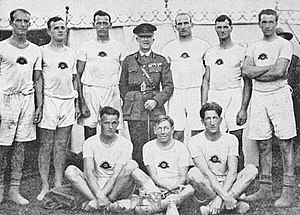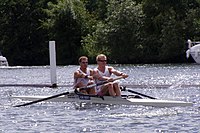
James Bruce Tomkins, is an Australian rower, seven-time World Champion and a three-time Olympic gold medalist. He is Australia's most awarded oarsman, having made appearances at six Olympic games ; eleven World Championships ; four Rowing World Cups and eighteen state representative King's Cup appearances – the Australian blue riband men's VIII event,. Tomkins is one of only five Australian athletes and four rowers worldwide to compete at six Olympics. From 1990 to 1998 he was the stroke of Australia's prominent world class crew – the coxless four known as the Oarsome Foursome.
The Riverview Gold Cup Regatta is a rowing regatta with limited club events and mainly school crew events, held annually by Saint Ignatius' College, Riverview, in Sydney, New South Wales, Australia. It is an official Rowing NSW event within the New South Wales club season. The Riverview Gold Cup is the trophy contested by the men's open senior eight - the blue riband event of the day.
Duncan Seth Free is a retired Australian rower and Olympic gold medallist. He is 4-time Olympian and two-time world champion who represented Australia at four world rowing championships in both sculls and sweep oared boats. He was a six-time Australian national sculling champion.
David G. A. Douglas is an Australian former rower. He was a five-time Australian national champion, won a gold medal at the inaugural North American rowing championships in 1967 and won a silver medal at the 1968 Summer Olympics.
The Australian Rowing Championships is an annual rowing event that determines Australia's national rowing champions and facilitates selection of Australian representative crews for World Championships and the Olympic Games. It is Australia's premier regatta, with states, clubs and schools sending their best crews. The Championships commence with the National Regatta - men's, women's and lightweight events in open, under 23, under 19, under 17 and school age events. Rowers at the National Regatta race in their local club colours with composite crews permitted. The Championships conclude with the Interstate Regatta - currently eight events competed by state representative crews or scullers selected by the state rowing associations. The states compete for an overall points tally which decides the Zurich Cup.
Matthew Long is an Australian former Olympian rower. He was an Australian national champion, a representative at World Championships and won a bronze medal in the coxless pair at Sydney 2000

Daniel Noonan is an Australian former representative rower. He was a national champion, a world champion, a dual Olympian and an Olympic medal winner.
Daniel Burke is an Australian rower who won a silver medal at the 2000 Sydney Olympics. He's one of only two Australian oarsmen to have twice won the Grand Challenge Cup at the Henley Royal Regatta.

Henry Denis Hauenstein, MM was an Australian national representative rower and a World War I infantry officer. He was a three-time Australian national champion rower who competed for Australasia at the 1912 Summer Olympics in the men's eight. He was a member of the Australian men's selection eight which won the Grand Challenge Cup at the Henley Royal Regatta of 1912. He saw active service on the Western Front where he won the Military Medal and was a member of the AIF crew which at war's end, won at the 1919 Peace Regatta and brought the King's Cup to Australia.

Roger Berkeley Fitzhardinge was an Australian rower. He was a dual Australian champion who stroked an Australian crew which won the Grand Challenge Cup at the Henley Royal Regatta in 1912 and the Australian men's eight at the 1912 Summer Olympics.
Angus Widdicombe is an Australian rower. He is an Olympian, an Australian national champion, has represented at underage and senior world championships, winning consecutive silver medals at the 2017 and 2018 World Championships. He stroked the Australian men's eight at the Tokyo 2020 Olympics.
Kim Mackney is an Australian rower. He competed in the men's coxless pair event at the 1972 Summer Olympics. From school until the national elite representative level and onto a long world-class masters career, Mackney rowed competitively for over fifty years. He can be credited with salvaging and re-establishing the Glebe Rowing Club in Sydney after its 1992 demise.
Edward Officer Hale is an Australian former rower. He competed at the elite level over a fifteen-year period from 1970 to 1984, primarily as a sculler. He was a fourteen time Australian national champion - nine times in a single scull, four times in crewed sculling boats and once in a sweep oared pair. He won the New Zealand national single sculls championship in 1976. He represented at two World Rowing Championships and competed in the men's single sculls event at the 1976 Summer Olympics.
Islay Lee is an Australian former rower. He was a fifteen-time national champion in both sculls and sweep-oared boats, a national representative at world championships and a dual Olympian. He competed at the 1976 Summer Olympics and the 1980 Summer Olympics. From 1976 to 1980 he was Australia's prominent sweep-oared stroke, setting the pace in Sydney Rowing Club crews which won five successive national titles in the coxed four, three successive titles in a coxed pair, and in three successive King's Cup winning New South Wales selection eights.
Robert Black is an Australian rower. He is a national champion, a national representative in sculling and sweep-oared boats and twice an U23 World Champion.
Gillian Margaret Campbell is an Australian former representative rower. In the six seasons from 1988 to 1993 she was consistently in the top-tier of Australian heavyweight women scullers winning ten national sculling titles and one sweep-oared championship title. She competed in the women's double sculls event at the 1992 Summer Olympics.
Edward V "Terry" O'Hanlon is an Australian former rowing coxswain. He was seven times an Australian national champion who coxed Australian representative crews at two World Rowing Championships.
Sam Hardy is an Australian representative rower. He is a national champion, a national representative, an Olympian and won a bronze medals at the 2019 and 2022 World Rowing Championships.
Thomas McGill MM (1893–1969) was an Australian infantry officer who saw active service in WWI. At war's end he rowed in the AIF #1 eight to victory at the 1919 Henley Peace Regatta and brought the King's Cup to Australia. Post WWI he was a New South Wales state representative rower.
Edward O'Loughlin is an Australian paediatric gastroenterologist and a former national representative rower. As a sweep oarsman he was a 1974 national champion and an Australian representative in the men's eight at the 1974 World Championships. As a physician he has served as Head of Gastroenterology at Westmead Children's Hospital.







